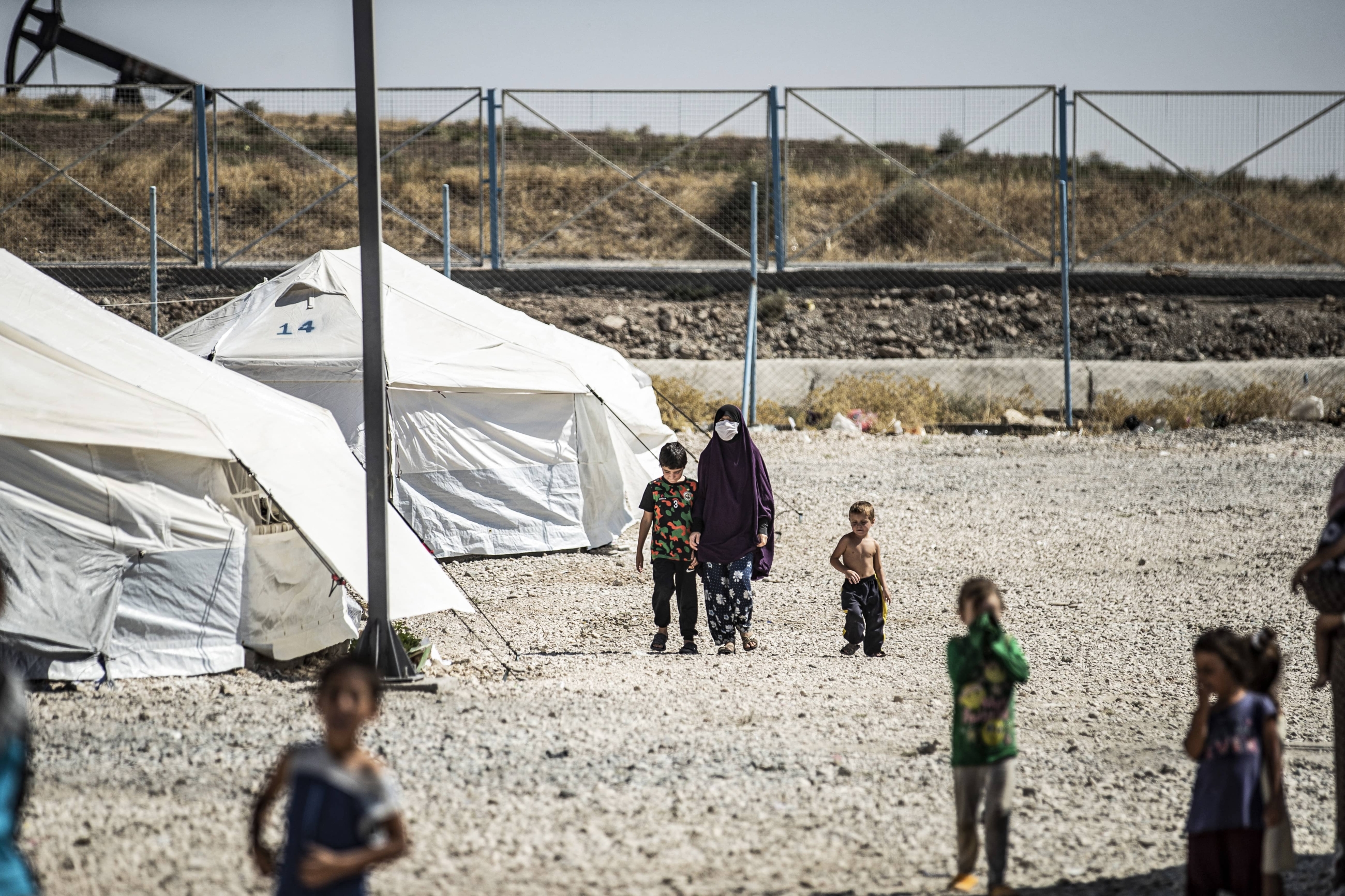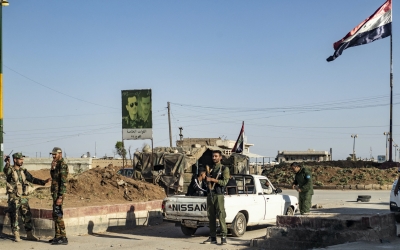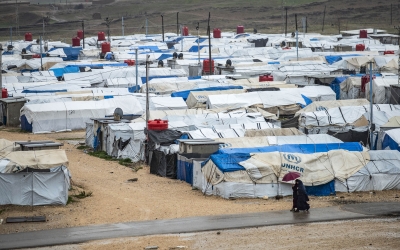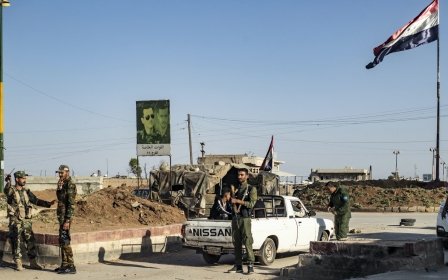Syria: Belgium repatriates group of women and children from al-Roj camp

Belgium has repatriated six mothers and 10 children under the age of 12 from camps for families of suspected members of the Islamic State (IS) group in northeastern Syria, the country's Federal Public Prosecutor's office said on Saturday.
"A plane chartered by the Belgian Government landed yesterday [Friday] at 21:20 at the military airport of Melsbroek," northeast of Brussels, a statement read. "On board were 6 Belgian women and 10 children coming directly from the al-Roj camp."
Roj is the smaller of two such camps in Kurdish-controlled Syria, where many foreign women and children are now held. Al-Hol, the main detention camp, also in the northeast of the country, is home to more than 60,000 people.
Four of the women were French speakers, from Brussels, according to the statement. The other two were from Dutch-speaking Antwerp.
Four of them have already been sentenced in absentia to five years in prison for "participation in the activities of a terrorist group". The Antwerp Court of Appeal is examining the case of the fifth woman, also sentenced to five years for the same offence.
The sixth woman is yet to be convicted, though she has been arrested under the same charge.
"Upon their arrival in Belgium, the Federal Prosecutor's Office proceeded to deprive all these adults of their liberty," the statement read. "They were transferred to different prisons after having been given the opportunity to separate from their children in good conditions."
The children were all born between 2012 and 2019.
"First, the physical and psychological health of these children, who have been living in difficult conditions in Syria for a long time, will be checked in a hospital," the statement read. "Then, an appropriate framework will be put in place on a case-by-case basis. The families concerned have been personally informed of the return of their relatives after the plane took off from Erbil," a city in northern Iraq.
This March, Belgium announced that it would begin the repatriation of all Belgian children being held in the camps under the age of 12, in compliance with a court order.
Yet despite Saturday's repatriations, there are still at least 13 Belgian nationals within the camps: six women and seven children, according to Geert Loots, a professor of psychology at the University of Brussels, who is part of Moeders Van Europa, a Belgian group pushing for the repatriation of Belgian nationals from the camps.
A spokesperson for Families for Repatriation International, a network for relatives of some of the detained, told MEE: "We are extremely happy for this outcome, showing that repatriation is possible, and we encourage the Belgian government to do more."
“I would like to have a fair discussion with [Belgian authorities], but it’s impossible. The reason why it’s impossible is because they have no arguments to support their position.”
- Nicolas Cohen, French lawyer representing Cassandra Bodart, who wasn't repatriated
"We call for repatriation of each and every citizen; men, women, and certainly children.”
Up to 15 Belgian men are still being detained by Kurdish authorities in prisons.
The women and children not repatriated remain in camps where conditions described by rights groups as “violent, unsanitary and inhumane” have led to the avoidable deaths of hundreds of babies and infants.
In June 2019, Belgium repatriated six orphans.
Six mothers and their 15 children also managed to escape the camps and get home via Turkey. These six women are now in prison, and most of the children live with relatives, according to Loots.
Belgian officials have so far not commented on why seven children and six women remain in Syria.
Who did Belgium leave behind?
But the Federal Public Prosecutor's statement said that the Belgian women who were repatriated had all met certain criteria, including:
- "Being the mother of one of the repatriated children; this was proven by means of DNA tests carried out on site a few weeks ago."
- "Satisfy a risk assessment carried out by the security services."
- "Clearly expressing a desire to return and to distance themselves from any extremist ideology."
According to Loots of Moeders Van Europa, Belgian authorities asked all the Belgian women in the camps to sign a document stating they will not reengage with IS or seek to harm Belgium.
One mother, who has four children, refused to sign, for unknown reasons, and remains in Syria.
One of the other women left behind has a child.
Another, a 28-year-old woman, has two. This woman has been in the camps for five years now, according to Loots, who is in regular contact with her. Unusually, her mother is also there with her and is one of the other Belgian women still in the camps.
She left Belgium to find her daughter after hearing she had travelled to IS-controlled territory in Syria, according to Loots.
The two escaped IS and have been living together in the Kurdish-run camps ever since.
Loots says the Belgian authorities asked to repatriate the 28-year-old's children without her and she refused.
Nicolas Cohen, a French lawyer representing Cassandra Bodart, a Belgian woman sentenced in absentia last year to five years in prison for joining IS, told MEE that Bodart was one of two other women who were not repatriated.
In 2020, the UN Committee against Torture ordered Belgium to protect and help Bodart.
“It’s very weird, because she’s the woman who’s best protected by international law,” Cohen told MEE.
“I would like to have a fair discussion with [Belgian authorities], but it’s impossible. The reason why it’s impossible is because they have no arguments to support their position.”
A spokesperson for the Belgian prime minister's office has not responded to requests for comment. MEE also contacted Kurdish authorities in northeastern Syria but has not had a response.
'A la carte' repatriation
A few countries, including Russia, Kazakhstan, Kosovo, and Bosnia-Herzegovina, have so far repatriated significant numbers of their own nationals.
But most Western nations, including many European Union member states and Australia, have repeatedly rejected calls to do so, with the exception of a few cases in which mostly orphaned children have been evacuated from the camps on humanitarian grounds.
The United States has repeatedly called on its allies to repatriate its citizens, calling the current situation "simply untenable", and even offering assistance with repatriations.
Repatriation: A country-by-country breakdown
+ Show - HideMost Western governments have refused to repatriate their nationals on the grounds that they do not have consular services in Syria and citing security concerns. Some have called for foreign nationals accused of links to IS to be tried locally.
Campaigners say governments are not being candid about the extent of their contacts with Kurdish authorities. They point to the ad hoc repatriation of orphans, the presence on the ground of NGOs and journalists, and visits to the region by Western envoys as proof that they have the capacity - but not the political will - to bring their nationals home.
Some countries have said they will take children but nor adult detainees. Kurdish authorities have refused these requests and campaigners say that separating children from their primary carers would breach their human rights. Some children have been repatriated with their mother's consent.
The following figures are estimates based on official figures, data provided by campaign groups and MEE's own research.
Australia: Eight orphans repatriated in June 2019. About 20 women and 48 children remain in the camps, and 12 men in prisons.
Belgium: Six orphans repatriated in June 2019. Six women and 10 children repatriated in July 2021. Up to 15 men, six women, and 7 children still detained.
Canada: One orphan repatriated in October 2020. Eight men, 13 women, 26 children still detained
Denmark: Two orphans repatriated. 12 Danish nationals and 30 children still detained. Dual nationals in Syria stripped of Danish citizenship
France: 28 children repatriated. About 450 French nationals, including about 270 children, still detained. Several French citizens sent to Iraq and sentenced to death.
Germany: Four children repatriated in August 2019, and a mother and three children repatriated in November 2019. About 50 men, 50 women and 150 children still detained
Netherlands: Two orphans repatriated. Dutch Supreme Court ruled in June that government is not obliged to repatriate 23 women and 56 children still detained. At least 13 Dutch men also detained
Sweden: Seven orphaned siblings repatriated in May 2019. About 40 adults and 50 children still detained
UK: At least four children repatriated. About 26 men and women and 60 children still detained. Many dual nationals in Syria stripped of British citizenship
US: Washington has called for the repatriation of all foreign nationals and has offered to help countries to take back their own citizens. All 27 Americans known to have been in Kurdish custody have been repatriated
Having ratified the Council of Europe Convention on Action against Trafficking (in 2009) and the UN Trafficking in Persons Protocol (in 2004), Belgium is legally obliged to safeguard and repatriate nationals who are deemed to have been trafficked out of the country.
Children cannot legally give consent to be trafficked, but governments justifying decisions to not repatriate their citizens often overlook this and treat them as adults who voluntarily joined IS.
"We are really calling [on state's] to look at terrorism cases… through the trafficking lens," said Tarana Baghirova, from the Office for Security and Co-operation in Europe (OSCE), at the launch of a British parliamentary enquiry into Brits trafficked to join IS on Tuesday.
"The starting point for prevention is identifying those people," she added, "seeing them as victims."
In April, the European Parliament called for the repatriation of children from European Union countries held in the camps. But the possibility that this would result in children separating from their mothers was criticised.
“It’s inhuman for European countries to say they’ll take the children back without their mothers,” said Loots of Moeders Van Europa. “This is child abuse by governments."
A spokesperson for Families for Repatriation International told MEE: “We call on governments to respect the rule of law that is the cornerstone of our democracies. We call on governments to respect their commitment to international human rights laws.”
"This 'a la carte' repatriation process based on undisclosed criteria and volatile motivations is cruel and utterly illegal."
Middle East Eye delivers independent and unrivalled coverage and analysis of the Middle East, North Africa and beyond. To learn more about republishing this content and the associated fees, please fill out this form. More about MEE can be found here.




